teamzr1
Supporting vendor
The EPA visited schools in Winthrop, Maine, late last month as part of an investigation into electric buses supplied to the schools through federal grants paid for by American tax dollars.
The probe comes after it was discovered that the buses built by a Canadian company have proven faulty, forcing kids to walk to and from school or the parents having to take time to drive them
Federal agents visited the Maine schools in late January while probing electric school buses built by the Quebec-based Lion Electric Company. Interim Superintendent Becky Foley explained the situation to the school board earlier this month, according to a report by the Kennebec Journal.
Foley said the EPA interviewed her and Josh Wheeler, the school district’s director of transportation, about four electric buses that have been plagued with problems ever since they arrived in Winthrop from Lion Electric in late 2023.
“I met with an EPA special agent last week to see if there was any fraud committed by Lion,” she told the school board on February 5.
“I think whatever resolution may occur will take some time, and I will keep the board posted.”
Lion Electric, headquartered in Saint-Jérôme, Canada, has recently filed for credit protection and was the first company to provide Maine with electric buses through a federal program seeking to replace gasoline-powered buses with EVs, the Journal reports.
But the Quebec-based company is no longer part of Maine’s program to provide electric buses to school districts in the state after it was discovered that the only buses that consistently experienced problems had all come from Lion Electric.
Additionally, Maine schools began reporting problems with their EV buses from day one.
In a letter sent to the EPA last month, Maine Department of Education Commissioner Pender Makin asked how she should advise the schools in her state with Lion Electric buses to proceed.
“In more than half of the school districts, including Winthrop, the buses remain inoperable,” Central Maine noted.
A former Lion Electric technician, meanwhile, told the outlet that the company’s buses are “more like a science project than a validated, road-legal vehicle.”
Notably, Lion Electric being under credit protection means it does not have the ability to ship the parts needed to fix its buses.
Meanwhile, the Canadian company reportedly owes Maine schools at least $57,000 toward bus rentals being used in place of its EVs that could not successfully operate.
“We are waiting for the technician to come up,” Foley said on Thursday. “Our buses are still under warranty, so we are waiting for the technician, but there are no technicians in Maine.”
“The tech would be the one to tell us what is wrong with the buses and what our buses need,” she added.
The probe comes after it was discovered that the buses built by a Canadian company have proven faulty, forcing kids to walk to and from school or the parents having to take time to drive them
Federal agents visited the Maine schools in late January while probing electric school buses built by the Quebec-based Lion Electric Company. Interim Superintendent Becky Foley explained the situation to the school board earlier this month, according to a report by the Kennebec Journal.
Foley said the EPA interviewed her and Josh Wheeler, the school district’s director of transportation, about four electric buses that have been plagued with problems ever since they arrived in Winthrop from Lion Electric in late 2023.
“I met with an EPA special agent last week to see if there was any fraud committed by Lion,” she told the school board on February 5.
“I think whatever resolution may occur will take some time, and I will keep the board posted.”
Lion Electric, headquartered in Saint-Jérôme, Canada, has recently filed for credit protection and was the first company to provide Maine with electric buses through a federal program seeking to replace gasoline-powered buses with EVs, the Journal reports.
But the Quebec-based company is no longer part of Maine’s program to provide electric buses to school districts in the state after it was discovered that the only buses that consistently experienced problems had all come from Lion Electric.
Additionally, Maine schools began reporting problems with their EV buses from day one.
In a letter sent to the EPA last month, Maine Department of Education Commissioner Pender Makin asked how she should advise the schools in her state with Lion Electric buses to proceed.
“In more than half of the school districts, including Winthrop, the buses remain inoperable,” Central Maine noted.
A former Lion Electric technician, meanwhile, told the outlet that the company’s buses are “more like a science project than a validated, road-legal vehicle.”
Notably, Lion Electric being under credit protection means it does not have the ability to ship the parts needed to fix its buses.
Meanwhile, the Canadian company reportedly owes Maine schools at least $57,000 toward bus rentals being used in place of its EVs that could not successfully operate.
“We are waiting for the technician to come up,” Foley said on Thursday. “Our buses are still under warranty, so we are waiting for the technician, but there are no technicians in Maine.”
“The tech would be the one to tell us what is wrong with the buses and what our buses need,” she added.


